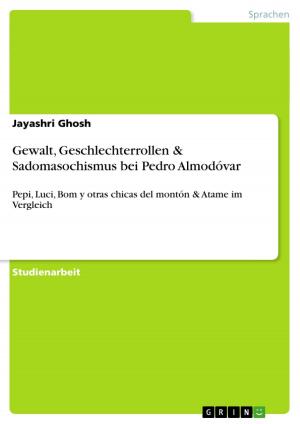| Author: | Rositsa Kronast | ISBN: | 9783640569700 |
| Publisher: | GRIN Verlag | Publication: | March 19, 2010 |
| Imprint: | GRIN Verlag | Language: | English |
| Author: | Rositsa Kronast |
| ISBN: | 9783640569700 |
| Publisher: | GRIN Verlag |
| Publication: | March 19, 2010 |
| Imprint: | GRIN Verlag |
| Language: | English |
Bachelor Thesis from the year 2007 in the subject English Language and Literature Studies - Comparative Literature, grade: 2,0, LMU Munich (Department für Allgemeine und Vergleichende Literaturwissenschaft), language: English, abstract: 1. Introduction: The Impact of the English Colonial Language Policy on the Postcolonial Identity My paper aims at exploring the effects of English colonial language policy on the postcolonial identity and their representations in postcolonial literature. Before applying to the main works, on which I will focus, The Enigma of Arrival and Small Island, I would like briefly to introduce the reader to the objectives of English colonial language policy. English colonial language education not only responds to the demands of access to European knowledge, but also it is a way of effective governance over the colonized people. Under the mask of the moral imperial duty to enlighten uncultivated subjects, the established discourses of Anglicism and Orientalism aim at fashioning the tastes, opinions and morals of the natives after the British imperial style, making them deny their origins in an attempt to become more English than the Englishmen. The process of reshaping the colonials' identity is said to be for the sake of their own good, being in need to be cured of their ignorance. The indigenous cultures and languages are regarded as unable either to contain or to convey any sort of valuable information, because of being primitive and rude as the natives themselves. This motion leads to the alienation of the aboriginal personality, which is most obvious in the construction of a place. Due to the systematically destruction of the native language and the imposition of the one of colonial power, a wide gap opens between the experience of a place and the language available to describe it. I will concentrate on the postcolonial problem of establishing one's own place in the world as a result of cultural denigration and dislocation. Further examples for the assertion of the indigenous culture as inferior are dichotomies like inventiveness versus imitativeness, rationality versus irrationality, intellect versus instinct, abstract thought versus concrete thought, the first item of each pair belonging to the Colonizer. These juxtapositions belong to the tradition of establishing false and romanticized motions of the colonies. However, the image of the Mother country, created by the colonial education turns to be as illusory as the idea of the colonies. The moments of encounter between the two cultures and realization of the falsity of the colonial concepts are central for my work. The motion of the supremacy of English ...
Bachelor Thesis from the year 2007 in the subject English Language and Literature Studies - Comparative Literature, grade: 2,0, LMU Munich (Department für Allgemeine und Vergleichende Literaturwissenschaft), language: English, abstract: 1. Introduction: The Impact of the English Colonial Language Policy on the Postcolonial Identity My paper aims at exploring the effects of English colonial language policy on the postcolonial identity and their representations in postcolonial literature. Before applying to the main works, on which I will focus, The Enigma of Arrival and Small Island, I would like briefly to introduce the reader to the objectives of English colonial language policy. English colonial language education not only responds to the demands of access to European knowledge, but also it is a way of effective governance over the colonized people. Under the mask of the moral imperial duty to enlighten uncultivated subjects, the established discourses of Anglicism and Orientalism aim at fashioning the tastes, opinions and morals of the natives after the British imperial style, making them deny their origins in an attempt to become more English than the Englishmen. The process of reshaping the colonials' identity is said to be for the sake of their own good, being in need to be cured of their ignorance. The indigenous cultures and languages are regarded as unable either to contain or to convey any sort of valuable information, because of being primitive and rude as the natives themselves. This motion leads to the alienation of the aboriginal personality, which is most obvious in the construction of a place. Due to the systematically destruction of the native language and the imposition of the one of colonial power, a wide gap opens between the experience of a place and the language available to describe it. I will concentrate on the postcolonial problem of establishing one's own place in the world as a result of cultural denigration and dislocation. Further examples for the assertion of the indigenous culture as inferior are dichotomies like inventiveness versus imitativeness, rationality versus irrationality, intellect versus instinct, abstract thought versus concrete thought, the first item of each pair belonging to the Colonizer. These juxtapositions belong to the tradition of establishing false and romanticized motions of the colonies. However, the image of the Mother country, created by the colonial education turns to be as illusory as the idea of the colonies. The moments of encounter between the two cultures and realization of the falsity of the colonial concepts are central for my work. The motion of the supremacy of English ...















